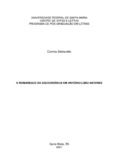| dc.creator | Stefanello, Camila | |
| dc.date.accessioned | 2021-11-17T13:47:21Z | |
| dc.date.available | 2021-11-17T13:47:21Z | |
| dc.date.issued | 2021-05-21 | |
| dc.identifier.uri | http://repositorio.ufsm.br/handle/1/22831 | |
| dc.description.abstract | The literary project by António Lobo Antunes, since the beginning of his fictional production, points, even though in different nuances, to a break with the limits of a linear and purely chronological articulation of temporality, opening, thus, to an exploration of the time of the characters’ minds. New and singular implications derive from this, not only for the formal management of the intrigue, but also for the constitution of the identity of the characters that inhabit this fictional universe. The doctoral thesis entitled “The romanesque of disagreement in António Lobo Antunes” investigates the manifestations of the philosophical concept of disagreement, postulated by Paul Ricoeur, in two novels by the Portuguese writer, namely, What are those horses that make shadow on the sea?, published in 2009, and To be midnight it is not enough want to be it, published in 2012. For this, we analyze, in both narratives, the fictional experience of time lived by the characters, which annihilates the agreement that cannot be re-established in the incomplete, chaotic and fragmented narrative act of the intrigue by Lobo Antunes. In this sense, based on the comprehension of temporality as aporetic and distended and of its implications for the discordant nature of the intrigue, we also investigates the problematic of constitution of a narrative identity. This because, in the process of constitution of identity, it is found implicated the potentiality of unit and of narrative totality of a life, considering that the narrative identity results of the dialectical relation between disagreement (the plurality of experienced events) and the agreement (the totalizing and cohesive articulation of these events). For this investigation, we use as theoretical referential, mainly, the work by Paul Ricoeur about the triad narrative, temporality and narrative identity. Thus, this thesis intends to identify, more than evincing formally the implications of the concept of disagreement in the novels by António Lobo Antunes, which is the conception of world and subject privileged by the narratives of the author, especially in his last phase of production. | eng |
| dc.description.sponsorship | Coordenação de Aperfeiçoamento de Pessoal de Nível Superior - CAPES | por |
| dc.language | por | por |
| dc.publisher | Universidade Federal de Santa Maria | por |
| dc.rights | Attribution-NonCommercial-NoDerivatives 4.0 International | * |
| dc.rights.uri | http://creativecommons.org/licenses/by-nc-nd/4.0/ | * |
| dc.subject | Romanesco | por |
| dc.subject | Discordância | por |
| dc.subject | António Lobo Antunes | por |
| dc.subject | Que cavalos são aqueles que fazem sombra no mar? | por |
| dc.subject | Não é meia-noite quem quer | por |
| dc.subject | Romanesque | eng |
| dc.subject | Disagreement | eng |
| dc.subject | What are those horses that make shadow on the sea? | eng |
| dc.subject | To be midnight it is not enough want to be it | eng |
| dc.title | O romanesco da discordância em António Lobo Antunes | por |
| dc.title.alternative | The romanesque of disagreement in António Lobo Antunes | eng |
| dc.type | Tese | por |
| dc.description.resumo | O projeto literário de António Lobo Antunes, desde o início de sua produção ficcional, aponta, ainda que em diferentes nuances, para uma ruptura com os limites de uma articulação linear e puramente cronológica da temporalidade, abrindo-se, então, a uma exploração do tempo da mente das personagens. Disso decorrem novas e singulares implicações não somente para o agenciamento formal da intriga, mas também para a constituição da identidade das personagens que habitam esse universo ficcional. A tese de doutoramento intitulada “O romanesco da discordância em António Lobo Antunes” investiga as manifestações do conceito filosófico de discordância, postulado por Paul Ricoeur, em dois romances do escritor português, a saber, Que cavalos são aqueles que fazem sombra no mar?, publicado em 2009, e Não é meia-noite quem quer, publicado em 2012. Para tanto, analisa-se, em ambas as narrativas, a experiência fictícia do tempo vivenciada pelas personagens, a qual aniquila a concordância que já não pode ser reestabelecida no ato narrativo incompleto, caótico e fragmentado da intriga de Lobo Antunes. Nesse sentido, partindo da compreensão da temporalidade como aporética e distendida e das suas implicações para a natureza discordante da intriga, investiga-se também a problemática da constituição de uma identidade narrativa. Isso porque, no processo de constituição da identidade, encontra-se implicada a potencialidade de unidade e de totalidade narrativa de uma vida, considerando-se que a identidade narrativa resulta da relação dialética entre a discordância (a pluralidade de acontecimentos vivenciados) e a concordância (a articulação totalizante e coesa desses acontecimentos). Para tal investigação, utiliza-se como referencial teórico, principalmente, o trabalho de Paul Ricoeur acerca da tríade narrativa, temporalidade e identidade narrativa. Com isso, esta tese pretende identificar, mais do que evidenciar formalmente as implicações do conceito de discordância nos romances de António Lobo Antunes, qual a concepção de mundo e de sujeito privilegiada pelas narrativas do autor, especialmente em sua última fase de produção. | por |
| dc.contributor.advisor1 | Oliveira, Raquel Trentin | |
| dc.contributor.advisor1Lattes | http://lattes.cnpq.br/8414562554311704 | por |
| dc.contributor.referee1 | Arnaut, Ana Paula dos Santos Duarte | |
| dc.contributor.referee2 | Angelini, Paulo Ricardo Kralik | |
| dc.contributor.referee3 | Vivian, Ilse Maria da Rosa | |
| dc.contributor.referee4 | Zamberlan, Lucas da Cunha | |
| dc.creator.Lattes | http://lattes.cnpq.br/5466363192587665 | por |
| dc.publisher.country | Brasil | por |
| dc.publisher.department | Letras | por |
| dc.publisher.initials | UFSM | por |
| dc.publisher.program | Programa de Pós-Graduação em Letras | por |
| dc.subject.cnpq | CNPQ::LINGUISTICA, LETRAS E ARTES::LETRAS | por |
| dc.publisher.unidade | Centro de Artes e Letras | por |



